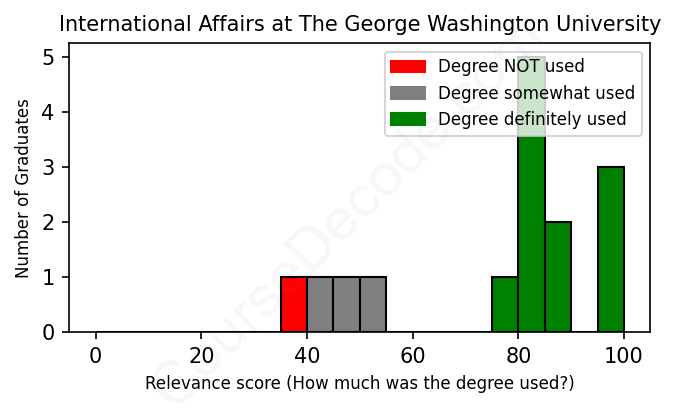
First, some facts. Of the International Affairs graduates from The George Washington University we've analyzed , here's how many have used (or NOT used) their degree in their career:

These are estimates based on AI analysis of 15 LinkedIn profiles (see below).
The verdict? Above average. Overall, with an average relevance score of 75%, International Affairs graduates from The George Washington University have a higher likelihood (+8%) of finding work in this field compared to the average graduate across all fields:
And for comparison, here's the chart for all profiles we've looked at across all degrees.
Also, after graduating, 46% of these graduates have pursued further education other than another Bachelor's degree (such as a Masters degree or other), compared to the average across all profiles of 35%. This suggests you may need more than just a Bachelors degree to be competitive as a International Affairs graduate.
See the details:
|
Relevance score: 89% We think this person has gone into a career highly relevant to their degree. We think this person has gone into a career highly relevant to their degree.
DEGREE INFOGraduated in 2015 from The George Washington University with a Bachelor of Arts (B.A.) in International Affairs. No other secondary education since. JOB HISTORY SINCE GRADUATIONIntern, 60 Minutes CBS News Jan 2015 - May 2015 Broadcast Associate, CBS This Morning  CBS News Jul 2015 - Mar 2017 Associate Producer, CBS This Morning  CBS News Mar 2017 - Apr 2019 Producer, CBS This Morning  CBS News Apr 2019 - Sep 2021 Producer, CBS Mornings  CBS News Sep 2021 - Present ABOUTI am constantly exploring the world around me: I have interviewed LGBT prisoners in El Salvador; swam with whale sharks in Mozambique; and worked in HIV/AIDS clinics on two continents. My vast work experiences and global travels have allowed to me continue my education outside of a physical classroom. I am currently an Emmy-winning producer at CBS Mornings. |
The top 10 most common jobs done by the graduates we've analyzed (ranked most common to least) are:
When looking at jobs held by people who graduated with a degree in International Affairs from The George Washington University, several common themes emerge. Many alumni have found roles within government agencies, especially the U.S. Department of State, engaging in budget analysis, financial management, and program management. These positions often require solid knowledge of international relations, making them highly relevant to their academic training. Others have taken routes in policy analysis or directly in legislative roles, such as being Congressional interns or assistants, which also aligns closely with skills from their coursework.
However, it’s clear that while many of these roles do tie back to the field of International Affairs, not every position maintains that direct connection. Some graduates have taken on jobs in sectors like media or private consulting, where the relevance to their degree can vary significantly. For instance, roles like account executive or various administrative positions don’t always require a deep understanding of international affairs principles. In short, while many alumni leverage their degrees in strongly related fields, a fair number end up in positions where the connection to International Affairs is less evident. This reflects a mix of pathways that those with an International Affairs background can pursue, highlighting both the versatility of the degree and its limitations when it comes to direct applicability in certain job markets.
Here is a visual representation of the most common words in job titles for International Affairs graduates (this is across all International Affairs graduates we've analyzed, not just those who went to The George Washington University):

Graduates of the International Affairs program at The George Washington University seem to have quite a solid track record when it comes to finding relevant jobs in their field. Right after graduating, many of these alumni land roles in government positions, think tanks, or NGOs, often starting off as program assistants or interns. For instance, those who graduated around 2012-2015 quickly moved into positions at the U.S. Department of State, Congressional offices, or international organizations like the United Nations. This pattern suggests that they utilize their degrees well, entering roles that align with their studies and are focused on public service, politics, or international relations.
When you look at where they end up five or ten years later, their career paths seem to continue on a successful trajectory. Many alumni advance into managerial or leadership roles such as directors and policy advisors, particularly in governmental and advocacy organizations. For example, one graduate went from an assistant director position in community relations to being the director of the Mayor’s Office of Community Relations. Others have taken unique paths into areas like media or consulting, like the transition from CBS News to managing programs related to global issues. Overall, while there are a few who veer off into unrelated fields or lower-tier positions, the majority maintain a strong connection to their degree in International Affairs, progressing into impactful careers that align with their educational background. So it looks like this program sets you up pretty well for a future in international relations or related fields!
Getting a Bachelor's degree in International Affairs at The George Washington University is definitely challenging, but it can be super rewarding too! The program covers a lot of complex topics like global politics, economics, and cultural studies, so you’ll need to be ready to put in some serious reading and writing time. The coursework is often rigorous, and you'll have to keep up with current events, which can feel overwhelming at times. However, if you're genuinely interested in the subject matter and enjoy learning about different cultures and political systems, it can be an engaging experience. Overall, it’s about as tough as most other degrees, maybe a bit more demanding due to the breadth of knowledge required, but if you're passionate about it, you'll likely find it worth the effort!
Most commonly, in the LinkedIn profiles we've looked at, it takes people 4 years to finish a Bachelor degree in International Affairs.
Looking at these International Affairs graduates from The George Washington University, it seems like most of them are doing pretty well in their careers, at least financially compared to the average starting salary for a new grad. Many of them have climbed the ladder within government positions or organizations, which usually pays decently. For instance, those working at the U.S. Department of State often start in roles that can lead to higher-paying analyst positions, and the same goes for those in consulting or program management roles in non-profits. However, there’s also a handful who have spent time in internships or starting roles that might not pay much, especially early in their careers. Overall, it's a mix, but it looks like many have progressed into decent-paying positions, particularly those with several years of experience.
Here is a visual representation of the most common words seen in the "about" section of LinkedIn profiles who have a Bachelor degree in International Affairs (this is across all International Affairs graduates we've analyzed, not just those who went to The George Washington University). This may or may not be useful:

Here are all colleges offering a Bachelor degree in International Affairs (ordered by the average relevance score of their International Affairs graduates, best to worst) where we have analyzed at least 10 of their graduates:
| College | Score | Count |
|---|---|---|
 The George Washington University The George Washington University
|
75 | 15 |